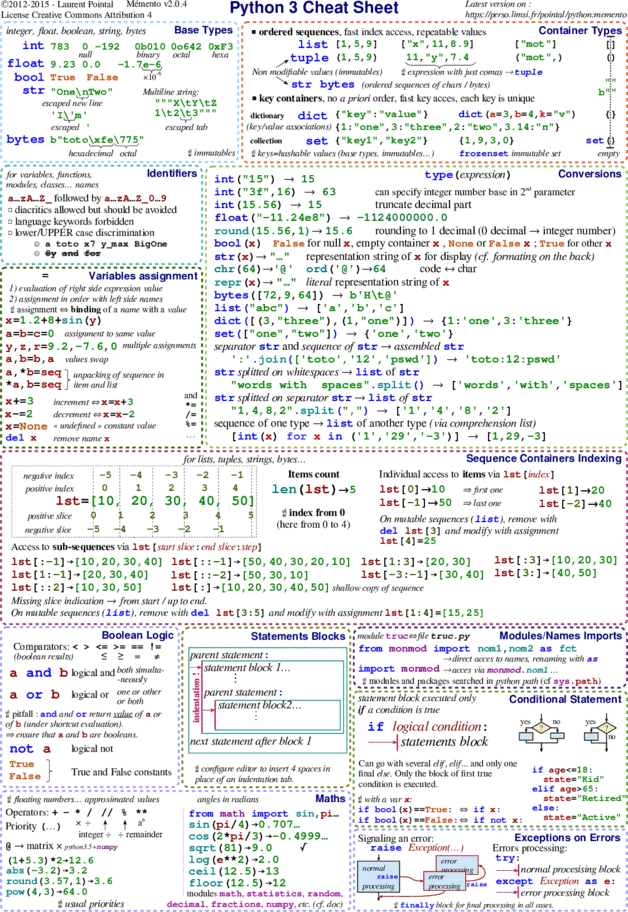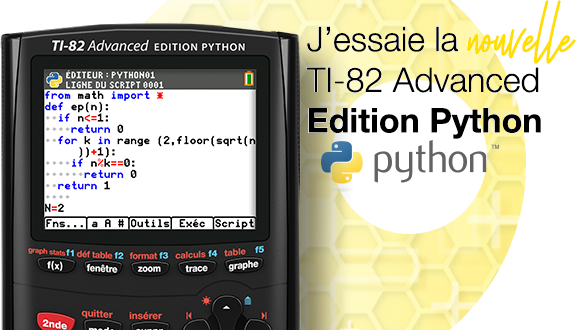Python-memento
DownloadTélécharger
Actions
Vote :
ScreenshotAperçu

Informations
Catégorie :Category: mViewer GX Creator App HP-Prime
Auteur Author: zidane13ES
Type : Application
Page(s) : 2
Taille Size: 363.46 Ko KB
Mis en ligne Uploaded: 28/06/2020 - 17:55:01
Uploadeur Uploader: zidane13ES (Profil)
Téléchargements Downloads: 166
Visibilité Visibility: Archive publique
Shortlink : http://ti-pla.net/a2631946
Type : Application
Page(s) : 2
Taille Size: 363.46 Ko KB
Mis en ligne Uploaded: 28/06/2020 - 17:55:01
Uploadeur Uploader: zidane13ES (Profil)
Téléchargements Downloads: 166
Visibilité Visibility: Archive publique
Shortlink : http://ti-pla.net/a2631946
Description
©2012-2015 - Laurent Pointal Mémento v2.0.4
License Creative Commons Attribution 4
Python 3 Cheat Sheet Latest version on :
https://perso.limsi.fr/pointal/python:memento
integer, float, boolean, string, bytes Base Types ◾ ordered sequences, fast index access, repeatable values Container Types
int 783 0 -192 0b010 0o642 0xF3 list [1,5,9] ["x",11,8.9] ["mot"] []
null binary octal hexa tuple (1,5,9) 11,"y",7.4 ("mot",) ()
float 9.23 0.0 -1.7e-6
-6 Non modifiable values (immutables) ☝ expression with just comas →tuple
bool True False ×10
""
str bytes (ordered sequences of chars / bytes)
str "OnenTwo" Multiline string: b""
escaped new line """XtYtZ ◾ key containers, no a priori order, fast key acces, each key is unique
'I'm' 1t2t3""" dictionary dict {"key":"value"} dict(a=3,b=4,k="v") {}
escaped ' escaped tab (key/value associations) {1:"one",3:"three",2:"two",3.14:"π"}
bytes b"totoxfe775" collection set {"key1","key2"} {1,9,3,0} set()
hexadecimal octal ☝ immutables ☝ keys=hashable values (base types, immutables…) frozenset immutable set empty
for variables, functions, Identifiers type(expression) Conversions
modules, classes… names
int("15") → 15
int("3f",16) → 63 nd
can specify integer number base in 2 parameter
a…zA…Z_ followed by a…zA…Z_0…9
◽ diacritics allowed but should be avoided int(15.56) → 15 truncate decimal part
◽ language keywords forbidden float("-11.24e8") → -1124000000.0
◽ lower/UPPER case discrimination round(15.56,1)→ 15.6 rounding to 1 decimal (0 decimal → integer number)
☺ a toto x7 y_max BigOne bool(x) False for null x, empty container x , None or False x ; True for other x
☹ 8y and for str(x)→ "…" representation string of x for display (cf. formating on the back)
chr(64)→'@' ord('@')→64 code ↔ char
= Variables assignment
repr(x)→ "…" literal representation string of x
1) evaluation of right side expression value
2) assignment in order with left side names bytes([72,9,64]) → b'Ht@'
☝ assignment ⇔ binding of a name with a value list("abc") → ['a','b','c']
x=1.2+8+sin(y) dict([(3,"three"),(1,"one")]) → {1:'one',3:'three'}
a=b=c=0 assignment to same value set(["one","two"]) → {'one','two'}
y,z,r=9.2,-7.6,0 multiple assignments separator str and sequence of str → assembled str
a,b=b,a values swap ':'.join(['toto','12','pswd']) → 'toto:12:pswd'
a,*b=seq unpacking of sequence in str splitted on whitespaces → list of str
*a,b=seq item and list "words with spaces".split() → ['words','with','spaces']
and str splitted on separator str → list of str
x+=3 increment ⇔ x=x+3 *=
x-=2 decrement ⇔ x=x-2 /= "1,4,8,2".split(",") → ['1','4','8','2']
x=None « undefined » constant value %= sequence of one type → list of another type (via comprehension list)
del x remove name x … [int(x) for x in ('1','29','-3')] → [1,29,-3]
for lists, tuples, strings, bytes… Sequence Containers Indexing
negative index -5 -4 -3 -2 -1 Items count Individual access to items via lst[index]
positive index 0 1 2 3 4 len(lst)→5 lst[0]→10 ⇒ first one lst[1]→20
lst=[10, 20, 30, 40, 50] lst[-1]→50 ⇒ last one lst[-2]→40
positive slice 0 1 2 3 4 5 ☝ index from 0
On mutable sequences (list), remove with
negative slice -5 -4 -3 -2 -1 (here from 0 to 4)
del lst[3] and modify with assignment
lst[4]=25
Access to sub-sequences via lst[start slice:end slice:step]
lst[:-1]→[10,20,30,40] lst[::-1]→[50,40,30,20,10] lst[1:3]→[20,30] lst[:3]→[10,20,30]
lst[1:-1]→[20,30,40] lst[::-2]→[50,30,10] lst[-3:-1]→[30,40] lst[3:]→[40,50]
lst[::2]→[10,30,50] lst[:]→[10,20,30,40,50] shallow copy of sequence
Missing slice indication → from start / up to end.
On mutable sequences (list), remove with del lst[3:5] and modify with assignment lst[1:4]=[15,25]
Boolean Logic Statements Blocks Modules/Names Imports
module truc⇔file truc.py
Comparators: < > <= >= == != from monmod import nom1,nom2 as fct
(boolean results) ≤ ≥ = ≠ parent statement: →direct acces to names, renaming with as
a and b logical and both simulta-
statement block 1… import monmod →acces via monmod.nom1 …
indentation !
-neously ⁝ ☝ modules and packages searched in python path (cf sys.path)
a or b logical or one or other parent statement: statement block executed only
or both Conditional Statement
statement block2… if a condition is true
☝ pitfall : and and or return value of a or ⁝ yes no yes
of b (under shortcut evaluation). if logical condition: ? ?
⇒ ensure that a and b are booleans. no
not a logical not
...
License Creative Commons Attribution 4
Python 3 Cheat Sheet Latest version on :
https://perso.limsi.fr/pointal/python:memento
integer, float, boolean, string, bytes Base Types ◾ ordered sequences, fast index access, repeatable values Container Types
int 783 0 -192 0b010 0o642 0xF3 list [1,5,9] ["x",11,8.9] ["mot"] []
null binary octal hexa tuple (1,5,9) 11,"y",7.4 ("mot",) ()
float 9.23 0.0 -1.7e-6
-6 Non modifiable values (immutables) ☝ expression with just comas →tuple
bool True False ×10
""
str bytes (ordered sequences of chars / bytes)
str "OnenTwo" Multiline string: b""
escaped new line """XtYtZ ◾ key containers, no a priori order, fast key acces, each key is unique
'I'm' 1t2t3""" dictionary dict {"key":"value"} dict(a=3,b=4,k="v") {}
escaped ' escaped tab (key/value associations) {1:"one",3:"three",2:"two",3.14:"π"}
bytes b"totoxfe775" collection set {"key1","key2"} {1,9,3,0} set()
hexadecimal octal ☝ immutables ☝ keys=hashable values (base types, immutables…) frozenset immutable set empty
for variables, functions, Identifiers type(expression) Conversions
modules, classes… names
int("15") → 15
int("3f",16) → 63 nd
can specify integer number base in 2 parameter
a…zA…Z_ followed by a…zA…Z_0…9
◽ diacritics allowed but should be avoided int(15.56) → 15 truncate decimal part
◽ language keywords forbidden float("-11.24e8") → -1124000000.0
◽ lower/UPPER case discrimination round(15.56,1)→ 15.6 rounding to 1 decimal (0 decimal → integer number)
☺ a toto x7 y_max BigOne bool(x) False for null x, empty container x , None or False x ; True for other x
☹ 8y and for str(x)→ "…" representation string of x for display (cf. formating on the back)
chr(64)→'@' ord('@')→64 code ↔ char
= Variables assignment
repr(x)→ "…" literal representation string of x
1) evaluation of right side expression value
2) assignment in order with left side names bytes([72,9,64]) → b'Ht@'
☝ assignment ⇔ binding of a name with a value list("abc") → ['a','b','c']
x=1.2+8+sin(y) dict([(3,"three"),(1,"one")]) → {1:'one',3:'three'}
a=b=c=0 assignment to same value set(["one","two"]) → {'one','two'}
y,z,r=9.2,-7.6,0 multiple assignments separator str and sequence of str → assembled str
a,b=b,a values swap ':'.join(['toto','12','pswd']) → 'toto:12:pswd'
a,*b=seq unpacking of sequence in str splitted on whitespaces → list of str
*a,b=seq item and list "words with spaces".split() → ['words','with','spaces']
and str splitted on separator str → list of str
x+=3 increment ⇔ x=x+3 *=
x-=2 decrement ⇔ x=x-2 /= "1,4,8,2".split(",") → ['1','4','8','2']
x=None « undefined » constant value %= sequence of one type → list of another type (via comprehension list)
del x remove name x … [int(x) for x in ('1','29','-3')] → [1,29,-3]
for lists, tuples, strings, bytes… Sequence Containers Indexing
negative index -5 -4 -3 -2 -1 Items count Individual access to items via lst[index]
positive index 0 1 2 3 4 len(lst)→5 lst[0]→10 ⇒ first one lst[1]→20
lst=[10, 20, 30, 40, 50] lst[-1]→50 ⇒ last one lst[-2]→40
positive slice 0 1 2 3 4 5 ☝ index from 0
On mutable sequences (list), remove with
negative slice -5 -4 -3 -2 -1 (here from 0 to 4)
del lst[3] and modify with assignment
lst[4]=25
Access to sub-sequences via lst[start slice:end slice:step]
lst[:-1]→[10,20,30,40] lst[::-1]→[50,40,30,20,10] lst[1:3]→[20,30] lst[:3]→[10,20,30]
lst[1:-1]→[20,30,40] lst[::-2]→[50,30,10] lst[-3:-1]→[30,40] lst[3:]→[40,50]
lst[::2]→[10,30,50] lst[:]→[10,20,30,40,50] shallow copy of sequence
Missing slice indication → from start / up to end.
On mutable sequences (list), remove with del lst[3:5] and modify with assignment lst[1:4]=[15,25]
Boolean Logic Statements Blocks Modules/Names Imports
module truc⇔file truc.py
Comparators: < > <= >= == != from monmod import nom1,nom2 as fct
(boolean results) ≤ ≥ = ≠ parent statement: →direct acces to names, renaming with as
a and b logical and both simulta-
statement block 1… import monmod →acces via monmod.nom1 …
indentation !
-neously ⁝ ☝ modules and packages searched in python path (cf sys.path)
a or b logical or one or other parent statement: statement block executed only
or both Conditional Statement
statement block2… if a condition is true
☝ pitfall : and and or return value of a or ⁝ yes no yes
of b (under shortcut evaluation). if logical condition: ? ?
⇒ ensure that a and b are booleans. no
not a logical not
...













